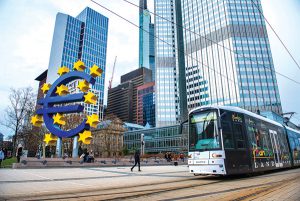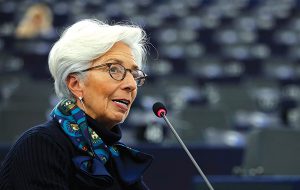Bloomberg
The European Central Bank (ECB) has “every reason†not to respond as forcefully as the Federal Reserve to soaring consumer prices, according to President Christine Lagarde.
“We’re all in very different situations,†Lagarde told the France Inter radio station on Thursday in an interview. Inflation is “clearly weaker†in the euro area, while the region’s economic recovery is also not as
advanced as in the US, she said.
“We have every reason to not react as quickly and as abruptly as we could imagine the Fed might,†Lagarde said. “But we have started to respond and we, of course, stand ready to respond with monetary policy if figures, data, facts, require it.â€
The ECB has come under pressure to act after inflation in the currency bloc hit a record 5% last month. But while officials have agreed to wind down pandemic stimulus, they say an interest-rate increase is highly unlikely this year since the current bout of inflation is driven by supply shocks and a spike
in energy costs, and should gradually ease.
Under current conditions and inflation forecasts, “an increase in interest rates is not expected in 2022,†ECB Governing Council member Pablo Hernandez de Cos told Spanish television broadcaster TVE in a separate interview on Thursday.
The Fed, meanwhile, has signaled that it will start raising rates as soon as March after consumer-price growth reached 7% in December. That’s the most in almost four decades and is fuelling fears of a cost-of-living squeeze.
Financial markets are testing the ECB’s resolve to wait out the surge in prices, betting on a rate hike as soon as September. Benchmark German debt yields also climbed above zero for
the first time since before the pandemic on Wednesday.
Lagarde didn’t appear concerned when asked about that development.
Rising yields mean “the fundamentals of the economy are recovering,†she said. “It means there’s confidence in growth and in such conditions rates will increase gradually.â€
The European Central Bank is facing an intensifying stand-off with financial markets over when it will begin raising one of the world’s lowest interest rates.
Despite insistence by officials that a hike is very unlikely in 2022, money markets now see a 10-basis-point increase to the deposit rate to minus 0.4% as early as September. They’re also betting borrowing costs exit sub-zero territory by the end of next year for the first time since 2014.
After the ECB last met in December, euro-area inflation numbers for that month came in stronger than expected. Instead of slowing down, price growth accelerated further to hit a record 5%.
While the recent spike in energy costs means inflation may stay elevated for longer, ECB officials expect the rate to slow this year. Markets aren’t convinced.
“It is quite hard to see how the market will regain confidence that inflation is transitory in the short term, because we’re going to see some quite difficult data over the next few months still,†said Sandra Holdsworth, head of rates at Aegon Asset Management. “The market will just remain nervous ahead of the March ECB meeting because they’ll get concerned that the ECB will change policy and perhaps taper quicker just like the Fed did.â€
Economists, for now, back the ECB’s position, though in recent weeks some — including JPMorgan Chase & Co. and UBS Group AG — have brought forward their predictions on an interest-rate lift-off.
 The Gulf Time Newspaper One of the finest business newspapers in the UAE brought to you by our professional writers and editors.
The Gulf Time Newspaper One of the finest business newspapers in the UAE brought to you by our professional writers and editors.

